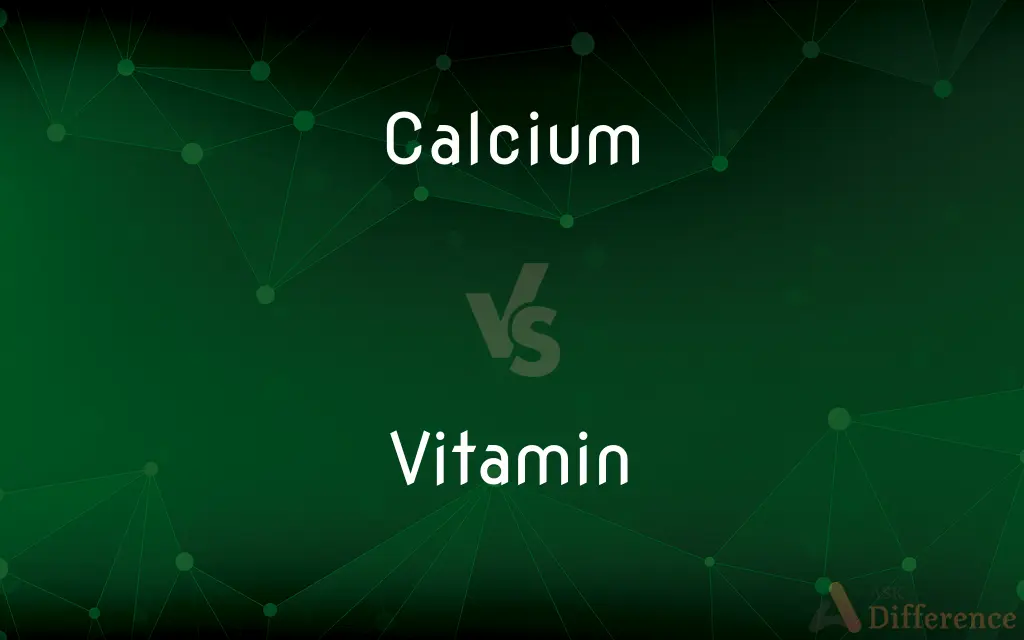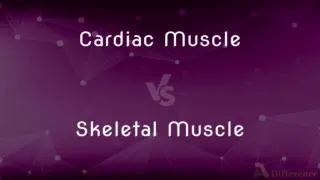Calcium vs. Vitamin — What's the Difference?
Edited by Tayyaba Rehman — By Fiza Rafique — Published on November 13, 2024
Calcium is a mineral essential for bone health, while vitamins are organic compounds required for various bodily functions.

Difference Between Calcium and Vitamin
Table of Contents
ADVERTISEMENT
Key Differences
Calcium, an essential mineral, is crucial for building and maintaining strong bones and teeth, as well as for proper functioning of muscles and nerves. Vitamins, on the other hand, are a diverse group of organic compounds that are vital for growth, metabolism, and overall health. Each vitamin has a unique role in the body, such as Vitamin D's role in calcium absorption or Vitamin C's role in immune function.
While calcium is singular in its primary source and function, vitamins are categorized into two main types: fat-soluble and water-soluble, each with different dietary sources and roles in the body. Calcium is primarily obtained through dairy products and leafy greens, whereas vitamins are found in a wide range of foods, from fruits and vegetables to meats and dairy.
The body requires calcium in relatively large amounts compared to vitamins, which are needed in smaller quantities. However, both are essential for maintaining health, and deficiencies in either can lead to significant health issues, such as osteoporosis from low calcium intake or scurvy from a lack of Vitamin C.
Despite their differences, calcium and vitamins often work synergistically in the body. For example, Vitamin D is crucial for calcium absorption, highlighting how the intake of vitamins can directly impact the effectiveness of calcium in bone health and beyond.
Comparison Chart
Type
Mineral
Organic compounds
ADVERTISEMENT
Primary Function
Bone and teeth health, muscle function, nerve transmission
Various functions including metabolism, immune support, cell growth
Sources
Dairy products, leafy greens, fortified foods
Fruits, vegetables, meats, dairy, grains
Amount Required
Higher amounts needed
Required in smaller quantities
Categories
Singular
Divided into fat-soluble and water-soluble
Deficiency Effects
Osteoporosis, muscle spasms, dental problems
Varies by vitamin: e.g., scurvy (Vitamin C), rickets (Vitamin D)
Compare with Definitions
Calcium
Calcium is a mineral essential for the development and maintenance of strong bones and teeth.
Increasing calcium intake can help prevent osteoporosis.
Vitamin
Vitamins are organic compounds that are essential for normal growth and nutrition, required in small quantities in the diet.
Vitamin C is important for immune function.
Calcium
Found in dairy products, leafy greens, and fortified foods.
Milk is a primary source of calcium.
Vitamin
Each vitamin has specific roles, such as Vitamin A for vision and Vitamin D for calcium absorption.
Vitamin E acts as an antioxidant, protecting cells from damage.
Calcium
Crucial for bone health, muscle function, and nerve signaling.
Calcium plays a key role in muscle contraction.
Vitamin
Broadly found in fruits, vegetables, meats, and dairy products.
Citrus fruits are a great source of Vitamin C.
Calcium
Adults need about 1,000 mg per day, varying by age and gender.
Women over 50 should increase their calcium intake to 1,200 mg per day.
Vitamin
Varies significantly depending on the vitamin.
Adult males need 90 mg of Vitamin C daily.
Calcium
Adequate intake reduces the risk of osteoporosis and bone fractures.
A diet rich in calcium supports overall skeletal health.
Vitamin
Prevents vitamin deficiency diseases and supports overall health.
Adequate Vitamin D intake is crucial for bone health.
Calcium
A silvery, moderately hard alkaline-earth metal that constitutes approximately 3.6 percent of the earth's crust and is a basic component of most animals and plants. It occurs naturally in limestone, gypsum, and fluorite, and its compounds are used to make plaster, quicklime, Portland cement, and metallurgic and electronic materials. Atomic number 20; atomic weight 40.08; melting point 842°C; boiling point 1,484°C; specific gravity 1.54; valence 2. See Periodic Table.
Vitamin
Any of various fat-soluble or water-soluble organic substances that are essential in minute amounts for normal growth and activity of living organisms. They are synthesized by bacteria and plants and are obtained by animals chiefly in their diet.
Calcium
The chemical element (Symbol Ca), with an atomic number 20. It is a soft, silvery-white alkaline earth metal which occurs naturally as carbonate in limestone and as silicate in many rocks.
Vitamin
A preparation containing one or more vitamins, often taken as a dietary supplement.
Calcium
(countable) An atom of this element.
Vitamin
Any of a specific group of organic compounds essential in small quantities for healthy human growth, metabolism, development, and body function; found in minute amounts in plant and animal foods or sometimes produced synthetically; deficiencies of specific vitamins produce specific disorders.
A food rich in vitamins
Calcium
An elementary substance; a metal which combined with oxygen forms lime. It is of a pale yellow color, tenacious, and malleable. It is a member of the alkaline earth group of elements. Atomic weight 40. Symbol Ca.
Vitamin
Any of several organic chemical substances not synthesized by an animal and required in small quantities for normal metabolism, present in and obtained from the natural foods eaten by the animal. Human vitamins are also produced synthetically, and taken in pure form or in mixtures, as dietary supplements. Deficiencies of specific vitamins lead to certain specific disorders, such as scurvy, caused by an insufficiency of vitamin C (ascorbic acid).
Vitamin
Any of a group of organic substances essential in small quantities to normal metabolism
Common Curiosities
What is the main difference between calcium and vitamins?
Calcium is a mineral essential for bone health, while vitamins are organic compounds required for various bodily functions.
What are the consequences of vitamin deficiency?
Vitamin deficiencies can lead to health issues like scurvy (Vitamin C), rickets (Vitamin D), and beriberi (Vitamin B1).
Can you take too much calcium or vitamins?
Yes, excessive intake of calcium or vitamins can lead to adverse health effects like kidney stones (calcium) or toxicity (certain vitamins).
What is the recommended daily intake of vitamins?
It varies by vitamin, age, gender, and health status.
What foods are rich in vitamins?
Fruits, vegetables, meats, dairy, and grains are rich in various vitamins.
How do vitamins and calcium work together?
Vitamins, like Vitamin D, enhance calcium absorption in the body.
What are the types of vitamins?
Vitamins are categorized into fat-soluble (A, D, E, K) and water-soluble (B-complex and C).
How can I get enough calcium in my diet?
Consume dairy products, leafy greens, and fortified foods.
Why is calcium important?
Calcium is crucial for building and maintaining strong bones and teeth, and for the function of muscles and nerves.
What are the benefits of a diet high in calcium and vitamins?
A diet rich in these nutrients supports bone health, immune function, and overall well-being.
Why are fat-soluble vitamins stored in the body, but water-soluble are not?
Fat-soluble vitamins are stored in fatty tissues and the liver, whereas water-soluble vitamins are not stored and excess is excreted.
What role does calcium play in muscle function?
Calcium is essential for muscle contraction and relaxation.
Can vitamin intake affect bone health?
Yes, especially Vitamin D, which is crucial for calcium absorption and bone health.
Is it better to get calcium and vitamins from food or supplements?
Obtaining nutrients from food is preferred, but supplements can be beneficial for certain individuals.
What are the signs of calcium deficiency?
Signs include brittle bones, muscle spasms, and dental problems.
Share Your Discovery

Previous Comparison
Chartered Flights vs. Scheduled Flights
Next Comparison
Cardiac Muscle vs. Skeletal MuscleAuthor Spotlight
Written by
Fiza RafiqueFiza Rafique is a skilled content writer at AskDifference.com, where she meticulously refines and enhances written pieces. Drawing from her vast editorial expertise, Fiza ensures clarity, accuracy, and precision in every article. Passionate about language, she continually seeks to elevate the quality of content for readers worldwide.
Edited by
Tayyaba RehmanTayyaba Rehman is a distinguished writer, currently serving as a primary contributor to askdifference.com. As a researcher in semantics and etymology, Tayyaba's passion for the complexity of languages and their distinctions has found a perfect home on the platform. Tayyaba delves into the intricacies of language, distinguishing between commonly confused words and phrases, thereby providing clarity for readers worldwide.










































